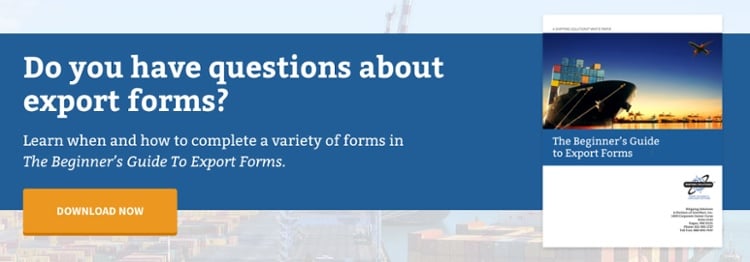The International Trade Blog Export Forms
A Stinky Letter of Credit and $22,000 in Rotten Potatoes
On: July 6, 2015 | By:  Roy Becker |
4 min. read
Roy Becker |
4 min. read
 The letter of credit is one of the most common forms of payment in the business of international trade and exporting. While the credit risk is assumed by the bank issuing the letter, the exporter must still ensure their documentation complies with all the terms spelled out in the letter of credit.
The letter of credit is one of the most common forms of payment in the business of international trade and exporting. While the credit risk is assumed by the bank issuing the letter, the exporter must still ensure their documentation complies with all the terms spelled out in the letter of credit.
Don’t give the issuing bank a reason to reject your payment because of poor-quality documentation. Read the true story about the exchanges between a Belgium bank, a North Dakota exporter, and a U.S. bank for insight into the significance of documentation when a letter is the currency of trade.
A bank I worked with in the U.S. received a $22,000 letter of credit from a Belgium bank for a shipment of potatoes from a North Dakota exporter. We confirmed the letter, which was written in French.
The exporter wanted to fly into our city, have us review the documents, and receive his cashier’s check all in the same day. As long as his documents met the terms in the letter of credit, we would honor his request.
Upon his arrival, Marcia—who had a degree in French—poured over the documents while the exporter sat nearby. Marcia found several confusing discrepancies. For example, it wasn’t clear if the letter required two documents—a weight certificate and an inspection certificate—or if one document, which contained both a weight certificate and an inspection certificate, would suffice.
Download the free eBook:
The Beginner's Guide to Export Forms
The exporter had presented only one document and noted the buyer needed only one document to move the goods through Belgium customs.
After some discussion, Marcia accepted the documents and paid the exporter $22,000 before he left town. We couriered the documents to the Belgium bank and withdrew the money from their account to pay the exporter.
Payment Refused!
A few days later, the Belgium bank surprised us when it denied the payment and asked us to reverse the entry to its account. Bank officials stated they couldn’t accept the documents because of eight discrepancies.
As we reviewed the eight discrepancies, we believed four held no merit. The other four, however, constituted a judgment call and seemed difficult to dispute, including the condition they wanted separate documents for a weight and inspection certificate.
We immediately contacted our legal counsel, and he advised us to sue the exporter for nonperformance. We questioned our right to sue since we had confirmed the letter and had (perhaps wrongly) examined the documents and found them in order.
The attorney reached for one of the many volumes on his shelves and found a court case that ruled if a beneficiary (exporter) presents documents under a letter of credit, they imply they have conformed to the letter of credit. (Otherwise, why would they present documents?) Since the documents did not conform, we could sue for wrongful presentation.
Reluctantly, we instructed our lawyer to contact the beneficiary who wisely said, “You’ll need to talk to my lawyer.” Upon contacting his lawyer, he informed us the beneficiary had declared bankruptcy, and we would get nothing even if we sued.
Rotten Potatoes
We contacted the issuing bank and asked them to store the goods while we resolved the dilemma. Unfortunately, the bank no longer had the goods! Apparently, the potatoes froze while enroute through the Great Lakes. By the time the potatoes arrived at their destination, they were rotten and the government ordered them destroyed.
The bank reminded us they still held the documents giving title to goods, which no longer existed.
It was now obvious why the Belgium bank refused payment on the insignificant document discrepancies. The buyer was notified of the rotten potatoes, contacted the bank, and instructed them to find something wrong in the documents and refuse payment.
We tried one other avenue. Since the shipper insured the goods, we contacted the insurance company to file a claim for rotten potatoes. Unfortunately, the coverage didn’t include the freezing of potatoes. With no other options, we took the $22,000 loss.
While this was a lesson learned for the bank, it’s also a powerful lesson for exporters: Always ensure your export documents strictly comply to the terms of the letter of credit so you don’t give the issuing bank any reason to reject the payment.

About the Author: Roy Becker
Roy Becker was President of Roy Becker Seminars based in Centennial, Colorado. His company specialized in educating companies how to mitigate the financial risk of importing and exporting. Previous to starting the training company, Roy had over 30 years experience working in the international departments of several banks where he assisted many importers and exporters with the intricate banking needs associated with international trade.
Roy served as adjunct faculty in the International MBA programs at the University of Denver and University of Colorado in Denver. He conducted seminars at the World Trade Center Denver and The Center for Financial Training Western States, and was a guest lecturer at several Denver area Universities.
Roy retired in 2021.


